Over the last 30 years, I have published an extensive body of scholarly work exploring emotions across cultures, featured in leading international journals and by well renowned academic publishers. My contributions span a wide array of research articles, book chapters, conference papers, and monographs, which have been highly recognized and frequently cited within the academic community. These publications demonstrate my dedication to advancing cross-cultural understanding of emotions, delivering innovative research in the field, and engaging deeply with critical global academic discourses. This selection of my most impactful publications reflects the breadth and depth of my research across key areas of cognitive (socio)linguistics, emotion studies, cultural evolution, and communication.

Below is a selection of what I consider to be some of my most relevant publications. For a complete list of my published works, please visit here.
Opensource versions of many of these works can be downloaded from my institutional repository page.
Journal article
Díaz-Vera, Javier E. (2026). Situating biblical ANGER: Embodied realism and the cognitive constraints shaping emotion metaphors in the Hebrew Bible. Biblical Interpretation: A Journal of Contemporary Approaches 34: in–press.
ISSN: 1568-5152
RELEVANCE: This article investigates how anger is conceptualized in the Hebrew Bible through the combined lenses of embodied realism, conceptual metaphor theory, and the history of emotions. Drawing on a comprehensive analysis of literal, metonymic, and metaphorical expressions, it demonstrates that anger in Biblical Hebrew is not a uniform concept but a hierarchically structured one, distinguishing human and divine modes. Human anger is portrayed as embodied, relational, and socially constrained, while divine anger is externalized as a cosmic or elemental force. The study argues for a theopathic model, in which divine emotion serves as the prototype for human affect, shaping the embodied vocabulary of anger. By situating these expressions within their cultural and theological contexts, the research challenges universalist models of emotion and highlights the historical variability of emotional language.
KEY AREAS: Biblical Hebrew, Anger, Embodied Cognition, Conceptual Metaphor, History of Emotions, Theopathic Model.



Journal article
Greco, Stefano, and Javier E. Díaz-Vera (2026). Does fear belong to Eurosceptics? FEAR as an emotion in the discourse of European Christian-Democratic, Socialist, and Liberal parties. Journal of Common Market Studies 64: in–press.
ISSN: 0021-9886
RELEVANCE: In this article, we examine how fear operates in the narratives of the European People’s Party (EPP), the Party of European Socialists (PES), and the Alliance of Liberals and Democrats for Europe (ALDE) during the 2009, 2014, 2019, and 2024 European Parliament elections. Our aim is to test whether the politics of fear is the exclusive prerogative of Eurosceptic or illiberal parties, or whether it is also strategically mobilised by pro-European actors at the core of EU institutions. Drawing on emotion discourse analysis, we show that fear is not only associated with populist Euroscepticism but can also be harnessed to strengthen European integration and legitimise the institutional order of the Union. By doing so, we highlight the central role of mainstream Europarties as agents within the EU’s emotional community, while underlining the need for further research on the affective foundations of European party politics.
KEY AREAS: Europarties, Emotional Politics, Fear, EU Politics, Emotion Discourse Analysis.



Book chapter
Díaz-Vera, Javier E. (2026). Basic emotions. In Xu Wen and Chris Sinha (eds) The Cambridge Encyclopedia of Cognitive Linguistics. Cambridge University Press.
ISSN: tbdRELEVANCE: This chapter revisits “basic emotions” from a cognitive-linguistic perspective. I contrast classic universalist accounts (Ekman, Izard) with constructionist and embodied-appraisal views, arguing that emotions are situated meanings shaped by body, culture, and discourse. Beyond metaphor, we show how grammar, interaction, and multimodality (e.g., gesture, visuals) actively constitute emotional experience. Methodologically, I foreground corpus/diachronic evidence and targeted elicitation for under-documented languages, and outline future links with experimental work and digital communication. The upshot: so-called “basic” emotions are dynamic categories rather than fixed biological kinds.
KEY AREAS: Cognitive linguistics, Embodiment, Metaphor & Grammar of Emotion, Discourse & Multimodality, Cross-linguistic/diacronic methods.



Journal article
Díaz-Vera, Javier E. (2025). The situatedness of aesthetic emotions: A review of the literature and a proposal for its study in variationist linguistics. Language Sciences 111: 101744.
ISSN: 0388-0001
RELEVANCE: In this paper, I explore how aesthetic emotions are deeply shaped by cultural and historical contexts, challenging the presumed universality of Western-centric frameworks. Drawing on constructionist models, I argue that prior knowledge and situational context play a key role in how these emotions are experienced and formed. Using a sociocognitive approach and corpus-based methodology, I analyze metaphorical patterns across Spanish, English, Old English, and Japanese to highlight the impact of linguistic and cultural diversity. By addressing existing research gaps, I aim to contribute to more inclusive and culturally sensitive theories of aesthetic emotion.
KEY AREAS: Aesthetic Emotions, Linguistic Variation, Situatedness, Embodiment, Culture.



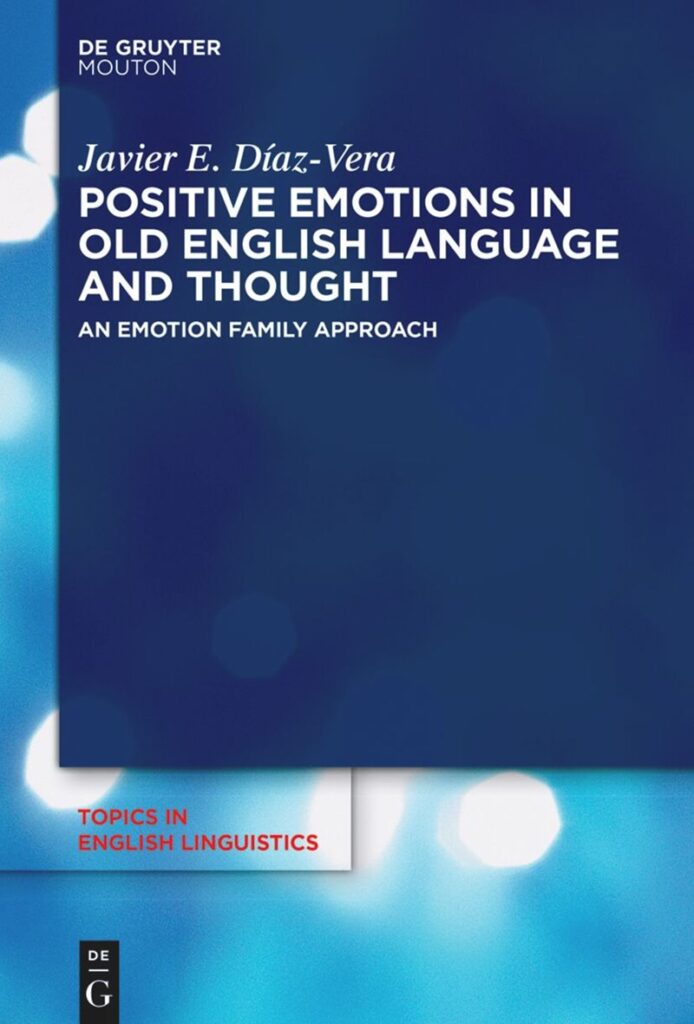
Monograph
Díaz-Vera, Javier E. (2025). Positive Emotions in Old English Language and Thought: An Emotion Family Approach (Topics in English Linguistics; TiEL 118), De Gruyter Mouton, 2025.
ISBN: 9783111641881
RELEVANCE: I have always been intrigued by how emotional expressions evolve over time, yet their dynamic and historical aspects are often overlooked. In this book, I focus on Old English positive emotions like happiness, love, and pride, combining cognitive linguistics and historical sociolinguistics to explore how these emotions were expressed and how their meanings shifted. By analyzing historical lexical data, I uncover how positive emotions reflected societal changes and cultural influences, shaping the figurative language of the time. This work highlights the deep connection between language, emotions, and the evolving human experience.
KEY AREAS: Cognitive Linguistics, English, Germanic Languages, Historical Linguistics, Linguistics and Semiotics, Sociolinguistics, Theoretical Frameworks and Disciplines.



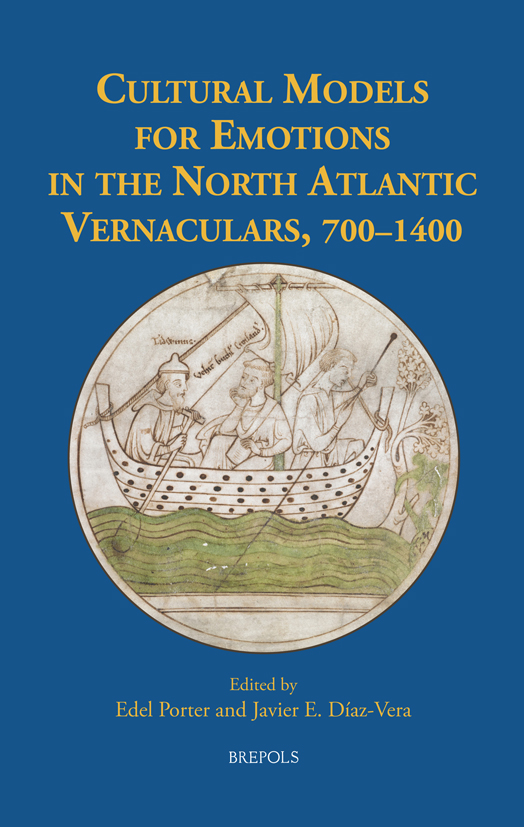
Multiauthored volume
Porter, Edel, and Javier E. Díaz-Vera. (2025). Cultural Models for Emotions in the North Atlantic Vernaculars, 700-1400 (Medieval Texts and Cultures of Northern Europe; TCNE 39), Brepols.
ISBN: 9782503610443
RELEVANCE: In this book, we explore the connections among medieval Britain, Ireland, Iceland, and the Scandinavian states, regions that, despite their diversity, shared cultural, historical, and ideological experiences setting them apart from the rest of Europe. The volume examines how these connections shaped shared emotional models and early cross-cultural emotional communities. Drawing on the oldest European vernacular traditions—Celtic, English, and Scandinavian—we trace cultural models for emotions rooted in pre-Christian times.
KEY AREAS: Germanic Languages, Historical Linguistics, Conceptual Metaphor, Cultural Linguistics, History of Emotions.

Book chapter
Díaz-Vera, Javier E., and Teodoro Manrique-Antón (2025). SADNESS in Old English and in Old Norse. Extrernalising the Embodied Mind in two North Atlantic Cultures. In Edel Porter and Javier E. Díaz-Vera (eds) Cultural Models for Emotions in the North Atlantic, 700-1400 (Medieval Texts and Cultures of Northern Europe; TCNE, 38). Brepols.
ISBN: 9782503610443
RELEVANCE: In this chapter, we contrast SADNESS in Old English and Old Norse, reconstructing their lexical fields with historical and cognitive linguistic methods. Both languages favour literal expressions, but figurative ones differ: Old English sees sadness as a low-control emotion, while Old Norse links it with anger, framing it as more controllable, often through revenge. We also find differing views of the mind: securely enclosed in Anglo-Saxon texts versus permeable boundaries in Old Norse.
KEY AREAS: Old English, Old Norse, Conceptual Metaphor, Cultural Linguistics, Sadness, Contrastive Linguistics.

Journal article
Díaz-Vera, Javier E. (2025). Negotiating converso identities in the inquisition courtroom: Impoliteness and self-politeness in the 1568-1569 trial of Catarina de Orta. Journal of Historical Pragmatics 26(1): 100–124.
ISSN: 1566-5852
RELEVANCE: In this article, I examine identity construction and negotiation through face work in a Portuguese Inquisition trial, focusing on the case of Catarina de Orta. Analyzing both the inquisitor’s questions and the defendant’s responses, I show how impoliteness and self-politeness coexist in courtroom discourse. The inquisitor uses impoliteness to assert power, provoke negative emotions, and undermine the defendant’s credibility. In contrast, the defendant employs self-politeness to protect her face against these attacks. This interplay shapes the competing narratives of accuser and defendant, evolving with each interrogation.
KEY AREAS: Portuguese, Inquisitions, Jewish Studies, Negative Emotions, Courtroom Discourse, (Im)politeness.



Journal article
Díaz-Vera, Javier E. (2024). Aesthetic emotional reactions and their verbal expression in a corpus of Japanese travellers’ online reviews. Language and Cognition 16(3): 762–784.
ISSN: 1866-9088
RELEVANCE: Using Conceptual Metaphor Theory, I examine how Japanese speakers express aesthetic emotions by analyzing a corpus of 1,100 TripAdvisor reviews focused on iconic landmarks like Mount Fuji and the Hiroshima Atomic Bomb Dome. My study categorizes aesthetic emotions into four types—pleasure, contemplation, amazement, and respect—and explores the metaphors and embodied experiences shaping these expressions. This research highlights the cultural influences on aesthetic reactions, challenging the assumption that such responses are universal and offering insights into the interplay between language, emotion, and culture.
KEY AREAS: Japanese, Aesthetic Emotions, Tourism, Embodiment, Culture.



Journal article
Díaz-Vera, Javier E. (2024). La expresión lingüística de las emociones estéticas: una propuesta para su estudio (The linguistic expression of aesthetic emotions: A proposal for its study). Textos en Proceso 10(1): 59–76.
ISSN: 2001-967X
RELEVANCE: This study deepens our understanding of how language captures and conveys aesthetic emotions across different Spanish dialects. By analyzing travelers’ reviews of the Giza Pyramids, I identify meaningful connections between linguistic expressions and somatic reactions, shedding light on how people articulate their emotional responses to art and cultural heritage. The research includes a state-of-the-art review of cultural variation in the expression of aesthetic emotions and is the first study to specifically target these expressions and emotions in the Spanish language. This contribution not only advances the study of linguistic expression of emotions but also offers insights into the interplay between language, culture, and aesthetic experience, paving the way for future research on the topic.
KEY AREAS: Spanish, Aesthetic Emotions, Embodiment, Conceptual Variation.



Journal article
Díaz-Vera, Javier E. (2024). Old English EMOTION IS TEMPERATURE: Cultural influences on a universal experience. Russian Journal of Linguistics 28(1): 33–54.
ISSN: 2687-0088
RELEVANCE: In this study I explore how temperature metaphors shape our understanding of emotions, focusing on Old English texts (850–1100). While high body temperature is typically linked to negative emotions like anger, my analysis reveals its use in describing positive emotions as well. This challenges the idea that temperature metaphors are purely universal and highlights their cultural variability, contributing to the broader debate on metaphor and embodiment.
KEY AREAS: Old English, TEMPERATURE metaphor, Universality vs. Cultural Specificity; History of Emotions, Conceptual Metaphor and Metonymy.



Journal article
Díaz-Vera, Javier E. (2022). Soft hearts and hard souls: The multiple textures of Old English feelings and emotions. Cognitive Linguistic Studies 9(1): 128–151.
ISSN: 2213-8722
RELEVANCE: In this article, I examine the shift from concrete to abstract meanings in Old English adjectives describing physical textures (e.g., roughness, smoothness). Using Old English dictionaries, I explore how these adjectives evolved to express physical, sensory, and emotional sensations. I categorize the secondary meanings into physical (e.g., weakness), sensory (e.g., sounds, sights), and emotional (e.g., grief, anger). I analyze these changes through metonymic, synesthetic, and metaphorical extensions. My study supports the idea that abstract concepts are rooted in physical experience and concludes by discussing the cultural influence of the Christianization of Anglo-Saxon England on these semantic shifts.
KEY AREAS: Old English, Emotion Metaphor, Cultural Linguistics, Sensorial Perception, Touch.
Journal article
Díaz-Vera, Javier E. (2021). Conceptual variation in the linguistic expression of aesthetic emotions: Cross-cultural perspectives on an underexplored domain. Studies in Psychology 42(2): 399–427.
ISSN: 0210-9395
RELEVANCE: My research focuses on how speakers express aesthetic emotions, an area less explored compared to utilitarian emotions. Aesthetic emotions were once thought to lack specific patterns of metaphoric and metonymic representation, making expressions for art-related feelings seem arbitrary. However, recent studies show that many aesthetic emotions have characteristic embodiment. I analyzed a corpus of traveler reviews written by native speakers of Japanese and English. The findings reveal that both groups often use similar conceptual patterns, but also highlight cultural differences in how these emotions are described. Additionally, some emotions are expressed only in one sub-corpus, suggesting a cultural tendency to experience certain emotions in specific contexts. Overall, this research enhances our understanding of how culture influences the expression of aesthetic emotions.
KEY AREAS: Psychology, Japanese, English, Aesthetic Emotions, Theoretical Frameworks and Disciplines.
Journal article
Caballero, Rosario, and Javier E. Díaz-Vera (2021). Metaphor variation and change in World Englishes: A corpus-based study of FEAR, HUMILIATION, and HOPE. ESSE Messenger 30(1): 1–21.
ISSN: 2518-3567
RELEVANCE: The study of metaphor variation and change presents unique challenges for systematic linguistic analysis. Recent developments in cognitive sociolinguistic theory emphasize the importance of understanding conceptual differences across linguistic varieties. Our research contributes to this field by using statistical analysis of large dialectal data sets to explore lexical variation and change in World English. We focus on why certain emotion conceptualizations are more common in some varieties. Our findings show that local socio-cultural models of emotions influence lexical variation and change at the dialectal level, highlighting the relevance of socio-cultural contexts in shaping language.
KEY AREAS: Cognitive Sociolinguistics, Emotion Metaphor, Cultural Linguistics, Geopolitics of Emotions, Sociology.



Journal article
Díaz-Vera, Javier E. (2021). Ælfric’s expressions for shame and guilt: A study in intra-writer conceptual variation. Studia Anglica Posnaniensia 56(1): 39–53.
ISSN: 0081-6272
RELEVANCE: This research analyzes onomasiological variation in Old English texts by Ælfric, focusing on how shame and guilt are expressed across genres. By examining all relevant expressions in the Ælfrician corpus, we propose a network of literal and figurative conceptualizations for these emotions. Our analysis reveals the tension between literal, metonymic, and metaphoric expressions. We show that the introduction of Augustinian psychology in Anglo-Saxon England led to (i) the decline of the Germanic view of shame and guilt as social control tools, (ii) the spread of new values, and (iii) the rise of embodied metaphors like SHAME IS A COVER and GUILT IS A BURDEN, reflecting a shift toward self-directed emotional evaluation in line with Christianization.
KEY AREAS: Old English, Conceptual Variation, Intra-writer Variation, Shame, Guilt.



Book chapter
Díaz-Vera, Javier E. (2020). The sense of touch: The haptic communication of emotions in Anglo-Saxon England from a linguistic perspective. In Maren Clegg Hyer and Gale R. Owen-Crocker (eds.). Sense and Feeling in Daily Living in the Early Medieval English World. Liverpool University Press, 88–106.
ISBN: 978-1789621440
RELEVANCE: This chapter reveals that the domain of tactile perception was a frequent source domain for Old English emotion metaphors, shedding light on their conceptualization of touch. It raises key questions about the role of touch in Anglo-Saxon communication and how tactile their culture was overall. Exploring their position on the high/low contact spectrum and its impact on everyday interactions requires interdisciplinary collaboration, offering new insights into the history of the senses and emotional expression in the past.
KEY AREAS: Old English, History of Emotions, Physical Perception, Touch.



Book chapter
Díaz-Vera, Javier E. (2019). The changing pursuit of happiness. In Susan Broomhall and Andrew Lynch (eds.). The Routledge History of Emotions in Europe: 1100-1700. Routledge, 371–387.
ISBN: 978-1315190778
RELEVANCE: This chapter explores the evolving cultural meanings of happiness in Western Europe between 1100 and 1700, offering a fresh perspective through the lens of Cognitive Linguistics. This work examines how metaphor and metonymy shaped the semantic evolution of happiness in historical varieties of English. By reconstructing these semantic changes, it uncovers shifts in cultural models of happiness, tracing the transition from medieval views of happiness as unattainable to its redefinition as a vital pursuit. This analysis contributes to our understanding of how language reflects and drives cultural transformations.
KEY AREAS: History of Emotions, Multimodal Metaphor, Situated Emotions, Cultural Artifacts, Canterbury Cathedral.



Journal article
Díaz-Vera, Javier E. (2016). Exploring the relationship between emotions, language and space: Construals of awe in medieval english language and pilgrimage experience. Studia Neophilologica 88(1): 165–189.
ISSN: 1651-2308
RELEVANCE: This research explores the profound impact of emotions on human existence, cognition, and behavior, emphasizing their role as a driving force in shaping attitudes and perceptions. By examining how cultural artifacts, crafted within specific ecological and socio-cultural contexts, elicit emotions across time and space, the study sheds light on the enduring connection between material culture and emotional experiences. This understanding has implications for various fields, including psychology, cultural studies, and communication.
KEY AREAS: Cognitive Sociolinguistics, Emotion Metaphor, Cultural Linguistics, Geopolitics of Emotions, Sociology.



Book chapter
Díaz-Vera, Javier E. (2016). Coming to past senses: Vision, touch, and their metaphors in Anglo-Saxon language and Culture. In Annnette Kern-Stähler, Beatrix Busse, and Wietse de Boer (eds.). The Five Senses in Medieval and Early Modern England. Brill, 36–66.
ISBN: 978-9004315495
RELEVANCE: This chapter is relevant as it examines the interconnectedness of sensory perception, language, and cognition, challenging the dominance of vision in Western thought. By exploring metaphorical links between physical and internal sensations in Old English texts, it highlights the nuanced roles of other senses, offering insights into the cultural and cognitive dynamics of Anglo-Saxon language and culture.
KEY AREAS: Old English, Polysemy, Metaphors, Vision, Touch, Cognition, Ocularcentrism.



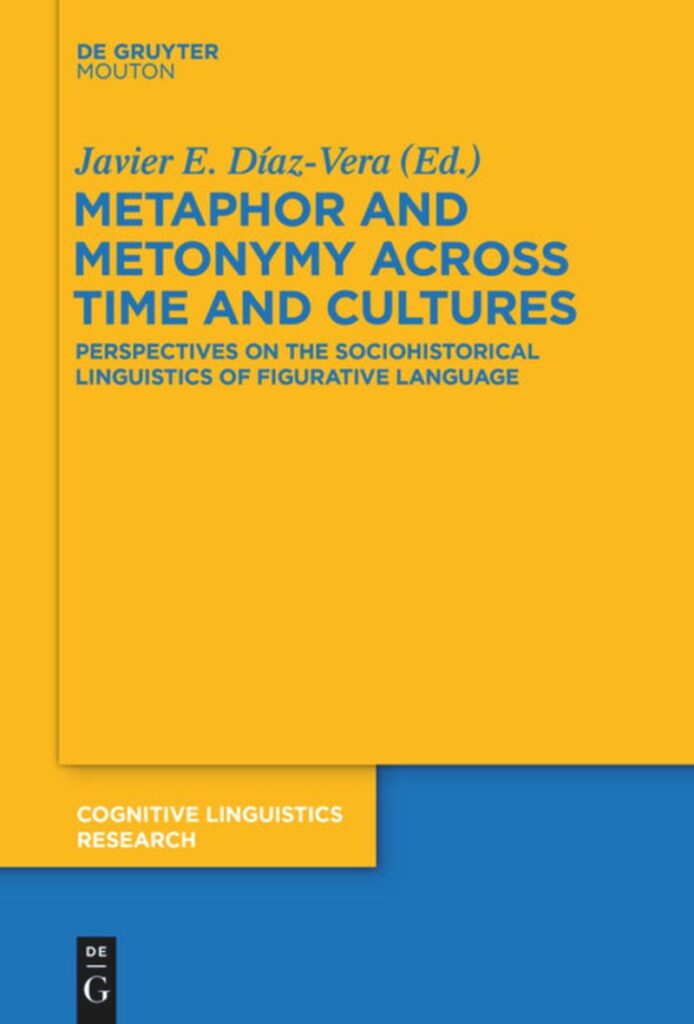
Multiauthored volume
Díaz-Vera, Javier E. (2015). Metaphor and Metonymy across Time and Cultures: Perspectives on the Sociohistorical Linguistics of Figurative Language (Cognitive Linguistics Research; CLR 52), De Gruyter Mouton.
ISBN: 978-3110335453
RELEVANCE: In this multiauthored volume, we explore the pervasive role of figurative language as a catalyst for linguistic change. Through diverse case studies, we examine how new metaphoric and metonymic expressions emerge and spread within speech communities, reflecting the need to encode ongoing social and cultural transformations in language. This work spans various languages and historical periods, offering a broad perspective on the relationship between figurative language and linguistic evolution.
KEY AREAS: Cognitive Linguistics, Historical Linguistics, Linguistics and Semiotics, Sociolinguistics, Theoretical Frameworks and Disciplines



Book chapter
Díaz-Vera, Javier E. and Teodoro Manrique-Antón (2015). ‘Better shamed before one than shamed before all’: Shaping shame in Old English and Old Norse texts. In Javier E. Díaz-Vera (2015) Metaphor and metonymy across time and cultures: Perspectives on the sociohistorical linguistics of figurative language. De Gruyter Mouton, 225–264.
ISBN: 978-3110335453
RELEVANCE: In this chapter, we analyze the evolution of the concept of shame in two distinct Germanic languages: Old English and Old Norse. Our primary goal is to trace the gradual transition from a shame-based society, where public humiliation functions as a tool for social control, to a guilt-based society, where personal recognition of wrongdoing and fear of divine punishment are central. This shift reflects a broader cultural change from collective to individual emotional experiences, which had profound implications for the linguistic expression of shame. Through the analysis of literal, metonymic, and metaphorical expressions of shame in our corpora of Old English and Old Norse texts, we aim to demonstrate how these languages reflect the evolving societal attitudes towards shame, highlighting the progressive individualization of this emotion in both cultures.
KEY AREAS: Old English, Old Norse, Metaphors, Shame, Cognition, Germanic Linguistics.



Journal article
Díaz-Vera, Javier E. (2014). On saying two things at once: The historical semantics and pragmatics of Old English emotion words. Folia Linguistica Historica 35(1): 201–134.
ISSN: 1614-7308
RELEVANCE: This research highlights the evolution of the conceptualization of shame in Old English, demonstrating the transformative impact of Christianity on emotional language and cultural values. By analyzing literal, metonymic, and metaphoric expressions, it reveals how embodied models of shame emerged alongside the adoption of Christian moral frameworks, reflecting a shift from honor-based to subjective experiences of emotion.
KEY AREAS: Old English, Shame, Embodiment, History of Emotions, Christianization.



Journal article
Díaz-Vera, Javier E. (2014). Emotions in the household: Emotion words and metaphors in ‘Domesday Book’ personal names. Names: A Journal of Onomastics 62(3): 165–176.
ISSN: 0027-7738
RELEVANCE: This research sheds light on the cultural significance of emotions in late Old English society through an analysis of emotion-related personal names recorded in the Domesday Book. By examining naming practices, including gender distribution and lexical combinations of emotion themes, the study reveals insights into societal values, emotional metaphors, and the evolution of language in post-Conquest England.
KEY AREAS: Old English, Name-giving, History of Emotions, Gender, Domesday Book.



Journal article
Díaz-Vera, Javier E. (2014). From Cognitive Linguistics to Historical Sociolinguistics: The evolution of Old English expressions of shame and guilt. Cognitive Linguistic Studies 1(1): 55–83.
ISSN: 2213-8722
RELEVANCE: This article examines the linguistic expression of shame and guilt in Old English. Through an analysis of expressions in a corpus of Old English texts, I propose a network of literal and figurative conceptualizations for each emotion. I argue that body-related expressions play a secondary role in the Anglo-Saxon imagery of shame and guilt. With the Christianization of England, new values and embodied metaphors emerged, such as SHAME IS REDNESS IN THE FACE and SHAME IS SOMETHING COVERING A PERSON, reflecting a shift towards internal self-evaluation rather than external judgment. These onomasiological changes offer insights into the lexical choices and sociolinguistic factors that shaped emotional expression in Anglo-Saxon England.
KEY AREAS: Historical Sociolinmguistics, Old English, Shame, Guilt, History of Emotions, Christianization.



Journal article
Díaz-Vera, Javier E. (2013). Woven emotions: Visual representations of emotions in medieval English textiles. Review of Cognitive Linguistics 11(2): 269–284.
ISSN: 1877-9751
RELEVANCE: This research underscores the shared conceptual frameworks underlying verbal and visual representations of emotions in Old English culture. By analyzing the Bayeux Tapestry, it reveals how Anglo-Norman artists systematically employed visual stimuli to convey emotions, highlighting differences in embodied and non-embodied representations across modalities. The study bridges linguistic and visual narratives, providing valuable insights into medieval emotion representation and communication.
KEY AREAS: Old English, Visual Metaphor, Textiles, Bayeux Tapestry, History of Emotions, Pictorial Runes.



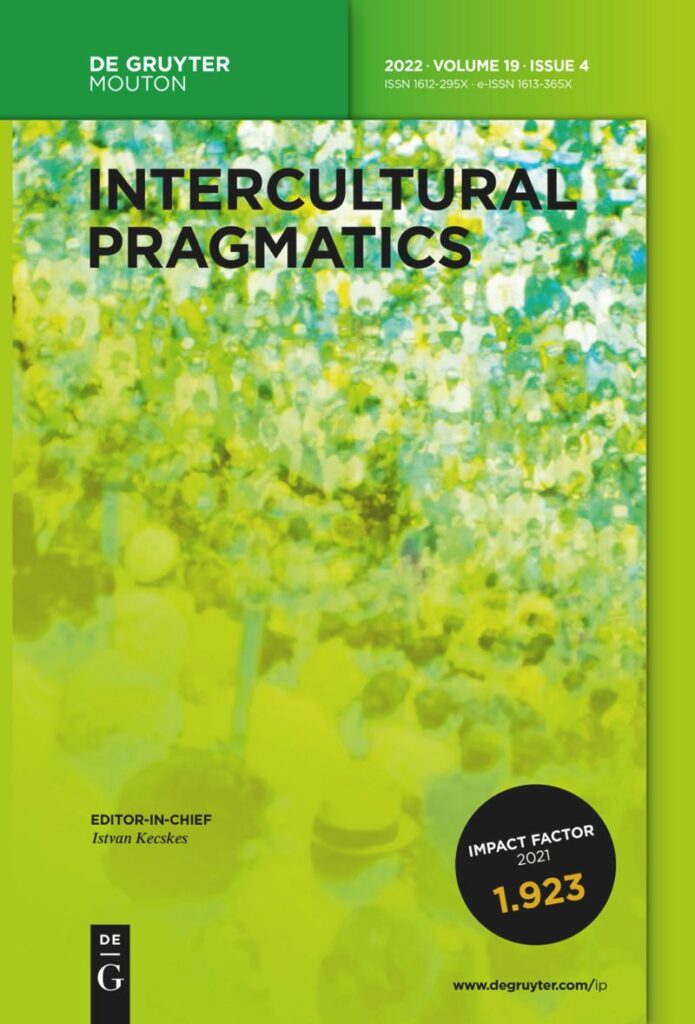
Guest editor
Caballero, Rosario, and Javier E. Díaz-Vera, Javier E. (2013). Metaphor and Culture: A Relationship at a Crossroads? (Special issue of the journal Intercultural Pragmatics), De Gruyter Mouton.
ISSN: 1613-365X
RELEVANCE: This special issue underscores the vital interplay between metaphor and culture, addressing key questions about how metaphors reflect and shape cultural identities across linguistic and cultural boundaries. By featuring diverse case studies and cross-linguistic analyses, it provides valuable insights into how metaphors operate within different languages and social contexts, revealing both universal patterns and culturally specific variations. The issue’s focus on non-English data highlights the need for broader cultural perspectives in metaphor research, offering practical implications for fields such as translation, intercultural communication, and language education. Together, these contributions advance our understanding of the dynamic relationship between metaphor, culture, and human cognition.
KEY AREAS: Metaphor, Culture, Cognition, Sociolinguistics, Intercultural Communication.



Journal article
Díaz-Vera, Javier E., and Rosario Caballero (2013). Exploring the feeling-emotions continuum across cultures: Jealousy in English and Spanish. Intercultural Pragmatics 10(2): 265–294.
ISSN: 1613-365X
RELEVANCE: In this article, we analyze metaphorical expressions of jealousy in American English and Peninsular Spanish. Using the Corpus of Contemporary American English and the Corpus de Referencia del Español, we examined occurrences of jealousy and celo(s) (and their derivatives) to identify metaphorical source domains for this emotion. These domains were grouped and compared both quantitatively and qualitatively across the two languages, with a focus on the role of sensory perception in shaping metaphors of jealousy. Our findings highlight the centrality of touch in both languages, alongside a broader variety of sensory-related metaphors in American English.
KEY AREAS: American English, Spanish Jealousy, Sensory Perception, Comparative Linguistics, Metaphor.



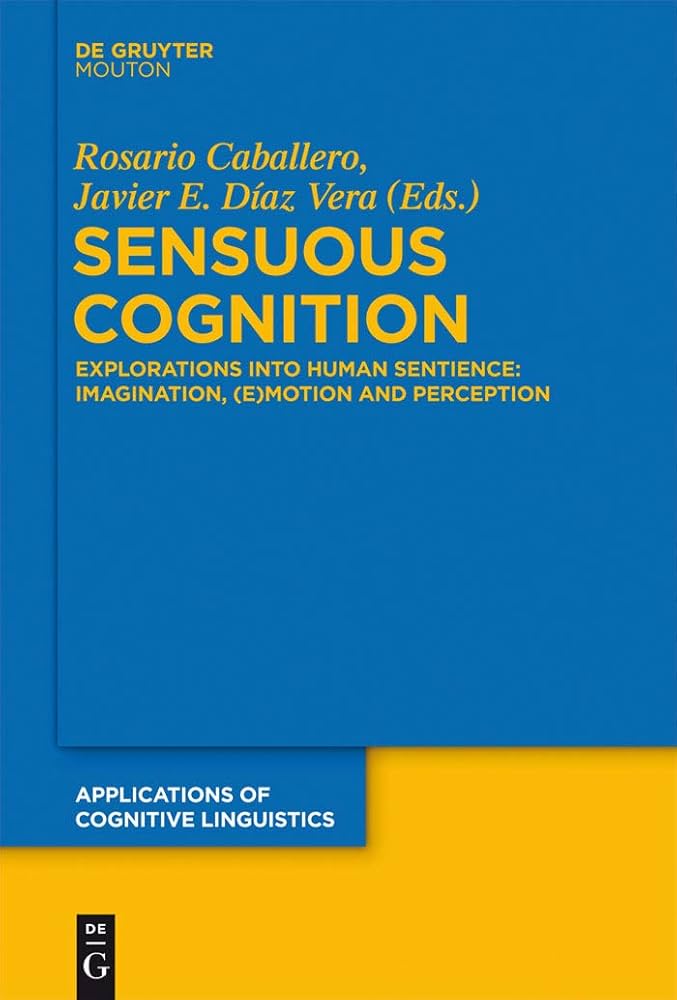
Multiauthored volume
Caballero, Rosario, and Javier E. Díaz-Vera (2013). Sensuous Cognition: Explorations Into Human Sentience: Imagination,(E)motion and Perception (Applications of Cognitive Linguistics; ACL 22), De Gruyter Mouton.
ISBN: 978-3110300765
RELEVANCE: In this book, we explore sensual cognition and its cultural manifestations through an interdisciplinary lens, adopting an ecological perspective to challenge core assumptions in Cognitive Linguistics (CL). We revisit the foundational CL principle that human thought arises from embodied experiences and interactions with diverse environments and cultures. Alongside examining this principle, the volume offers insights into the methodological and theoretical dimensions of CL and showcases its applications across varied cultural contexts.
KEY AREAS: Cognitive Linguistics, Embodied Mind, Emotions, Sensorial perception, Experiential Gestalts, Cultural Contexts.



Book chapter
Díaz-Vera, Javier E. (2013). Embodied emotions in medieval English language and visual arts. In Rosario Caballero and Javier E. Díaz-Vera (eds.). Sensuous Cognition: Explorations Into Human Sentience: Imagination,(E)motion and Perception, De Gruyter Mouton: 195–220.
ISBN: 978-3110300765
RELEVANCE: In this article, I explore the extent to which shared cognitive schemas underlie the expression of emotions in Old English through both language and visual media. Recent research has shown that verbal idioms for emotions are rooted in conceptual metaphors and metonymies tied to embodied experiences. Building on this, I analyze Old English expressions for fear and their visual representations in the Bayeux Tapestry. My findings reveal that Anglo-Norman artists employed a structured set of visual stimuli to represent fear, reflecting patterns consistent with linguistic expressions of the emotion.
KEY AREAS: Old English, Conceptual Change, Fear, History of Emotions, Bayeux Tapestry, Imagery, Embodied Cognition.



Journal article
Díaz-Vera, Javier E. (2011). Reconstructing the Old English cultural model for fear. Atlantis 33(1): 85–103.
ISSN: 0210-6125
RELEVANCE: In this article, I examine cultural conceptualizations of fear in Old English texts. My study follows three main steps: defining and organizing fear terms within their semantic space, assessing their relative significance, and analyzing their degrees of literalness along the continuum of literal meaning, metonymy, and metaphor. Through a detailed analysis of fear-related words and expressions in Anglo-Saxon texts, I aim to reconstruct and describe the cultural model of fear reflected in the language of this period.
KEY AREAS: Old English, Emotions, Metaphor, Fear, Cultural Models, Conceptualization.



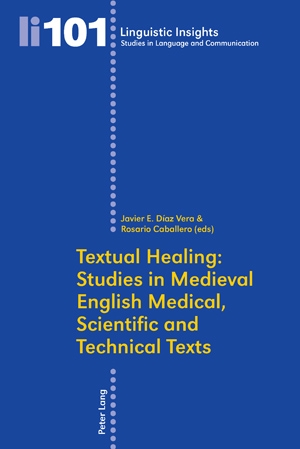
Multiauthored volume
Díaz-Vera, Javier E., and Rosario Caballero (2009) Textual healing: Studies in Medieval English medical, scientific and technical texts. Peter Lang.
ISBN: 978-3039118229
RELEVANCE: This volume focuses on the medical, scientific, and technical varieties of early English found in medieval manuscripts. The studies highlight how analyzing specialized texts offers insights into the early history and vernacularization of learned writing styles. Drawing from second-generation corpora and leveraging state-of-the-art methodologies, contributors address key issues in historical linguistics, discourse analysis, and pragmatics. Topics include the digital editing of texts, their role in social network analysis, and their value for identifying dialectal traits, providing a comprehensive exploration of this specialized linguistic domain.
KEY AREAS: Old and Middle English, Historical Linguistics, Sociolinguistics, Conceptualization, Textual Genres, Vernacularization.


Book chapter
Díaz-Vera, Javier E. (2009). Analysing the diffusion of scientific metaphors through a corpus of Middle English texts. In Javier E. Díaz-Vera and Rosario Caballero (eds.) Textual healing: Studies in Medieval English medical, scientific and technical texts. Peter Lang, 75–92.
ISBN: 978-3039118229
RELEVANCE: In this chapter, I analyze the diffusion of scientific metaphors in a corpus of Middle English medical texts. By examining metaphorical expressions within these specialized writings, I aim to trace how scientific ideas were communicated and adapted in medieval medical discourse. My research combines corpus analysis with historical linguistics to uncover the role of metaphor in shaping the language of science during this period, providing insights into the vernacularization of learned concepts and their dissemination across different audiences.
KEY AREAS: Middle English, Scientific Metaphor, Medical Texts, Vernacularization, Latin.


Journal article
Díaz-Vera, Javier E. (2007). Metaphors we learnt by: Cultural traditions and metaphorical patterns in the Old English vocabulary of knowledge. Revista Canaria de Estudios Ingleses 55(2): 269–284.
ISSN: 0211-5913
RELEVANCE: In this article, I examine the diachronic development, form, and function of metaphors in Old English language, literature, society, and iconography. Focusing on metaphors as drivers of diachronic change, I explore the early stages of the English language, using the Mind-as-Body metaphor as a framework. By analyzing perception verbs in Old English, I aim to reconstruct semantic connections made by Anglo-Saxon speakers, revealing how these metaphors reflect culturally significant aspects of their society.
KEY AREAS: Old English, Conceptual Metaphor, Mind-as-Body Metaphor, Knowledge.



Book chapter
Díaz-Vera, Javier E. (2004). Image schemata and light: A study in diachronic lexical domains in English. In Kay, Cristian, Carole Hough, and Irené Wotherspoon (eds.) New Perspectives in English Historical Linguistics. John Benjamins, 65–78.
ISBN: 978-9027295422
RELEVANCE: In this study, I investigate the relationship between image schemata and the concept of light across diachronic lexical domains in English. By tracing how light-related terms have evolved over time, I aim to uncover the underlying cognitive structures shaping their semantic development. This research highlights the role of image schemata in organizing meaning and provides insights into the interplay between embodied cognition and linguistic change throughout the history of English.
KEY AREAS: Old and Middle English, Image schemata, Semantic Change, Light, Aesthetic Beauty.




Multiauthored volume
Díaz-Vera, Javier E. (2002) A Changing World of Words: Studies in English Historical Lexicography, Lexicology, and Semantics. Brill/Rodopi.
ISBN: 978-9004489349
RELEVANCE: This volume covers a broad range of topics, including the development of dictionaries and glossaries, the history of English word formation, and shifts in lexical semantics over time. Contributions also delve into the sociocultural and pragmatic forces shaping English vocabulary, offering insights into how historical contexts have influenced language change. This interdisciplinary collection provides a vital resource for scholars interested in English historical lexicography, lexicology, and semantics, showcasing innovative approaches to understanding the dynamic nature of the English language.
KEY AREAS: History English, Historical Linguistics, Lexicology, Lexicography, Semantics, Pragmatics, Etymology.


Book chapter
Díaz-Vera, Javier E. (2002). The semantic architecture of the Old English verbal lexicon: A historical-lexicographical approach. In Javier E. Díaz-Vera (ed.) A Changing World of Words: Studies in English Historical Lexicography, Lexicology, and Semantics. Brill/Rodopi, 47–77.
ISBN: 978-9004489349
RELEVANCE: This work contributes to historical lexicography by examining the lexical organization of the subdimension of TOUCHING in Old English. Using the Functional-Lexematic Model (FLM), I analyze the structure of this field. The FLM highlights how paradigmatic and syntagmatic information in a lexical entry are interconnected, with a verb’s combinatory possibilities and syntactic patterns being semantically motivated. This approach sheds light on the interrelation between lexical structure and meaning in early English.
KEY AREAS: Old English, Functional-Lexematic Model, Sensorial Perception, Touch, Linguistic Reconstruction, Etymology.


